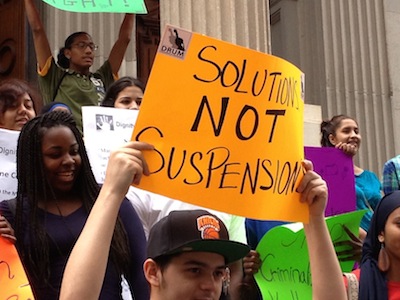D.O.E. Holds Annual Discipline Code Public Hearing

A chant of "solutions not suspensions" echoed through the Stuyvesant High School auditorium on Thursday evening, where a crowd largely made up of youth leaders assembled for the Department of Education's annual hearing on the Discipline Code.
Members of the Dignity in Schools Campaign – New York, which included students, parents, educators and advocates from across the country, challenged the newest proposed revisions to the 2013-2014 Discipline Code, angered by the lack of significant changes made to address the disproportionate suspension rate of students of color.
Manny Yusuf, an 11th grade student from Aviation High School, arrived with other youth members of Desis Rising Up and Moving (DRUM), a DSC-NY member organization, to give her testimony and push back against school pushout in city schools.
"I'm here to talk to the D.O.E. about having guidance intervention programs, peer mediation programs, and restorative justice practices in all schools throughout New York City," said Yusuf. "At my school I get to be a peer mediator. I want all students to get a full education in every single school and feel safe in their envrionment, instead of getting suspended."
The public hearing was hosted by Kathleen Grimm, Deputy Chancellor for the Division of Operations, and Elayna Konstan, Chief Executive for the Office of Safety and Youth Development, who explained that the intention of the code is to "set standards for safe and secure schools conducive to quality teaching and learning in each school."
However, the New York City School-Justice Partnership Task Force, a group of educators, civil rights activists and child advocates, examined disciplinary practices from the 2011-12 school year to find, "the overwhelming majority of school related suspensions, summonses and arrests are for minor misbehavior that occurs on a daily basis in most schools." The Discipline Code, as presented by the D.O.E., does not foster school envrionments conducive to quality teaching and learning in each school as intended.
In the 2011-12 school year, black students, who make up only 28 percent of the student population, received 53 percent of all suspensions. The disproportional rate of suspensions by race is a Civil Rights issue.
The hearing allowed two-minute intervals for speakers to raise their concerns and propose changes to the code. Speakers representing organizations such as the United Federation of Teachers, Legal Aid Society, Make the Road New York, Future of Tomorrow, Desis Rising Up and Moving, Teachers Unite, Advocates for Children, Children's Defense Fund of New York, YAYA Network and the New Settlement Apartment Parents Action Committee, stepped up on the microphone to urge the D.O.E. to change its approach to dealing with student discipline.
"This past year, there were 69,643 suspensions and 882 arrests, 90 percent of which were black and Latino students, and many were just for minor reasons," spoke Benia Darius, a youth leader from Make the Road New York. "This is not right. Being young, black and Latino automatically puts you in the school-to-prison pipeline."
Nilesh Vishwasrao, a student subjected to systemic pushout in 2010, continues to speak out against unjust suspension in New York City after facing repeated suspensions at Flushing High School.
"When I was in high school I was suspended three times and eventually pushed out of school, and that's the case of thousands of students," said Vishwasrao. "I want to see the stop of suspensions, and instead, standardize a system for schools to work to understand why students behave the way they do."
Recommendations fought for by the crowd included making the code more accessible for students and parents to read, investing in sustainable discipline alternatives, and developing stronger outreach to teachers and parents in the community.
DSC-NY is calling for an end to suspensions for all minor misbehavior in Level 3, an end to long-term suspensions of more than 10 days, along with the mandatory utilization of positive Guidance Interventions before suspensions are issued. As is, the new draft of the Discipline Code lists 29 infractions in Levels 4 and 5 for which students can be suspended for 30 to 90 days.
Dana Gascot, a youth leader from Future of Tomorrow shared, "Every day when I walk inside my school, the school safety agents curse at me randomly. When the school safety agents (SSA's) curse at me, I feel like they are not taking our safety seriously."
Gascot argued that the school staff is not protecting students, leading students to try to take matters into their own hands.
"I've seen many of my own friends react to what the SSA's do and say, and they would get suspended," said Gascot. "Suspensions are not solutions. Suspensions do not help students do better."
Another young activist from Brooklyn Technical High School, Shikha Rawat, argued, "Suspensions ignore the roots of student behavior."
"The ideal school…" said Rawat. "It would be full of guidance counselors and positive interventions, helping the students, and helping them solve their problems."
Read the original article here.
Written comments and suggestions will be accepted by the D.O.E. until June 20th and can be submitted to:
